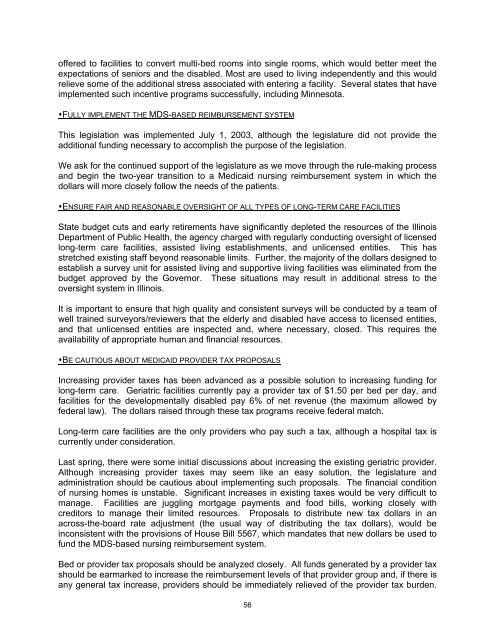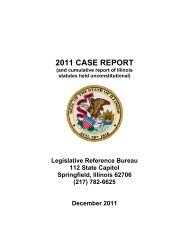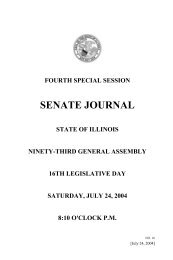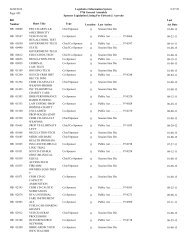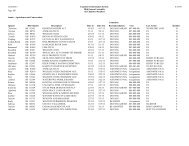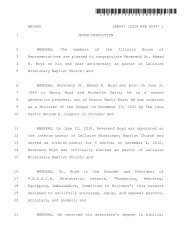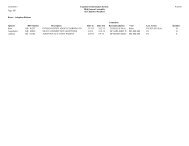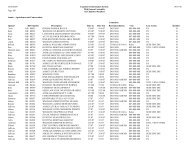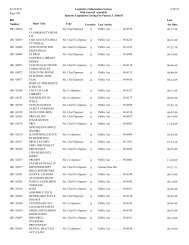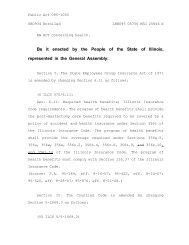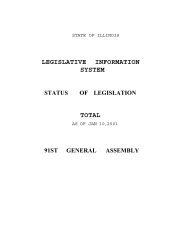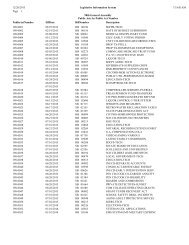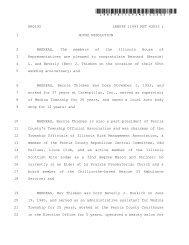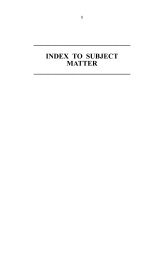Long-Term Care - Illinois General Assembly
Long-Term Care - Illinois General Assembly
Long-Term Care - Illinois General Assembly
You also want an ePaper? Increase the reach of your titles
YUMPU automatically turns print PDFs into web optimized ePapers that Google loves.
offered to facilities to convert multi-bed rooms into single rooms, which would better meet the<br />
expectations of seniors and the disabled. Most are used to living independently and this would<br />
relieve some of the additional stress associated with entering a facility. Several states that have<br />
implemented such incentive programs successfully, including Minnesota.<br />
FULLY IMPLEMENT THE MDS-BASED REIMBURSEMENT SYSTEM<br />
This legislation was implemented July 1, 2003, although the legislature did not provide the<br />
additional funding necessary to accomplish the purpose of the legislation.<br />
We ask for the continued support of the legislature as we move through the rule-making process<br />
and begin the two-year transition to a Medicaid nursing reimbursement system in which the<br />
dollars will more closely follow the needs of the patients.<br />
ENSURE FAIR AND REASONABLE OVERSIGHT OF ALL TYPES OF LONG-TERM CARE FACILITIES<br />
State budget cuts and early retirements have significantly depleted the resources of the <strong>Illinois</strong><br />
Department of Public Health, the agency charged with regularly conducting oversight of licensed<br />
long-term care facilities, assisted living establishments, and unlicensed entities. This has<br />
stretched existing staff beyond reasonable limits. Further, the majority of the dollars designed to<br />
establish a survey unit for assisted living and supportive living facilities was eliminated from the<br />
budget approved by the Governor. These situations may result in additional stress to the<br />
oversight system in <strong>Illinois</strong>.<br />
It is important to ensure that high quality and consistent surveys will be conducted by a team of<br />
well trained surveyors/reviewers that the elderly and disabled have access to licensed entities,<br />
and that unlicensed entities are inspected and, where necessary, closed. This requires the<br />
availability of appropriate human and financial resources.<br />
BE CAUTIOUS ABOUT MEDICAID PROVIDER TAX PROPOSALS<br />
Increasing provider taxes has been advanced as a possible solution to increasing funding for<br />
long-term care. Geriatric facilities currently pay a provider tax of $1.50 per bed per day, and<br />
facilities for the developmentally disabled pay 6% of net revenue (the maximum allowed by<br />
federal law). The dollars raised through these tax programs receive federal match.<br />
<strong>Long</strong>-term care facilities are the only providers who pay such a tax, although a hospital tax is<br />
currently under consideration.<br />
Last spring, there were some initial discussions about increasing the existing geriatric provider.<br />
Although increasing provider taxes may seem like an easy solution, the legislature and<br />
administration should be cautious about implementing such proposals. The financial condition<br />
of nursing homes is unstable. Significant increases in existing taxes would be very difficult to<br />
manage. Facilities are juggling mortgage payments and food bills, working closely with<br />
creditors to manage their limited resources. Proposals to distribute new tax dollars in an<br />
across-the-board rate adjustment (the usual way of distributing the tax dollars), would be<br />
inconsistent with the provisions of House Bill 5567, which mandates that new dollars be used to<br />
fund the MDS-based nursing reimbursement system.<br />
Bed or provider tax proposals should be analyzed closely. All funds generated by a provider tax<br />
should be earmarked to increase the reimbursement levels of that provider group and, if there is<br />
any general tax increase, providers should be immediately relieved of the provider tax burden.<br />
56


